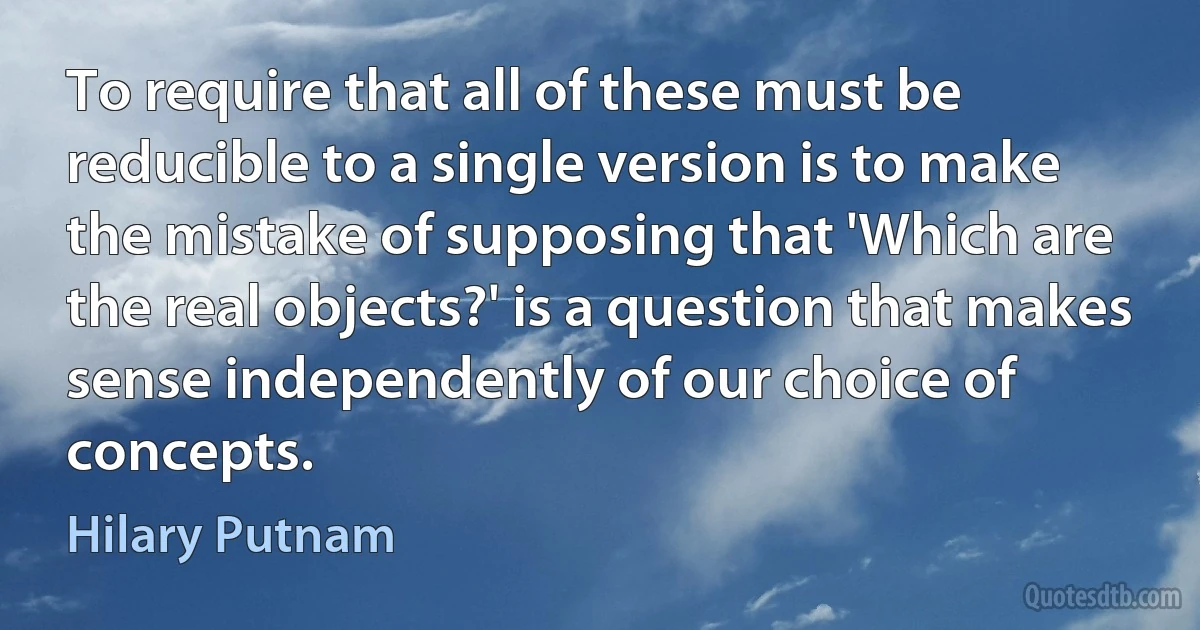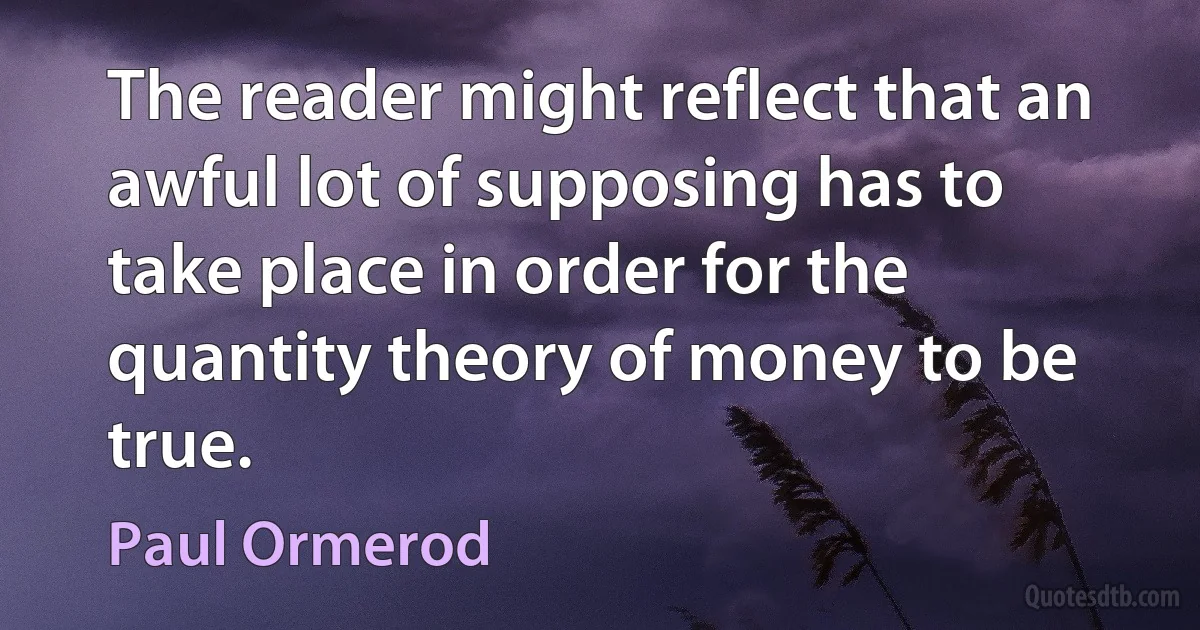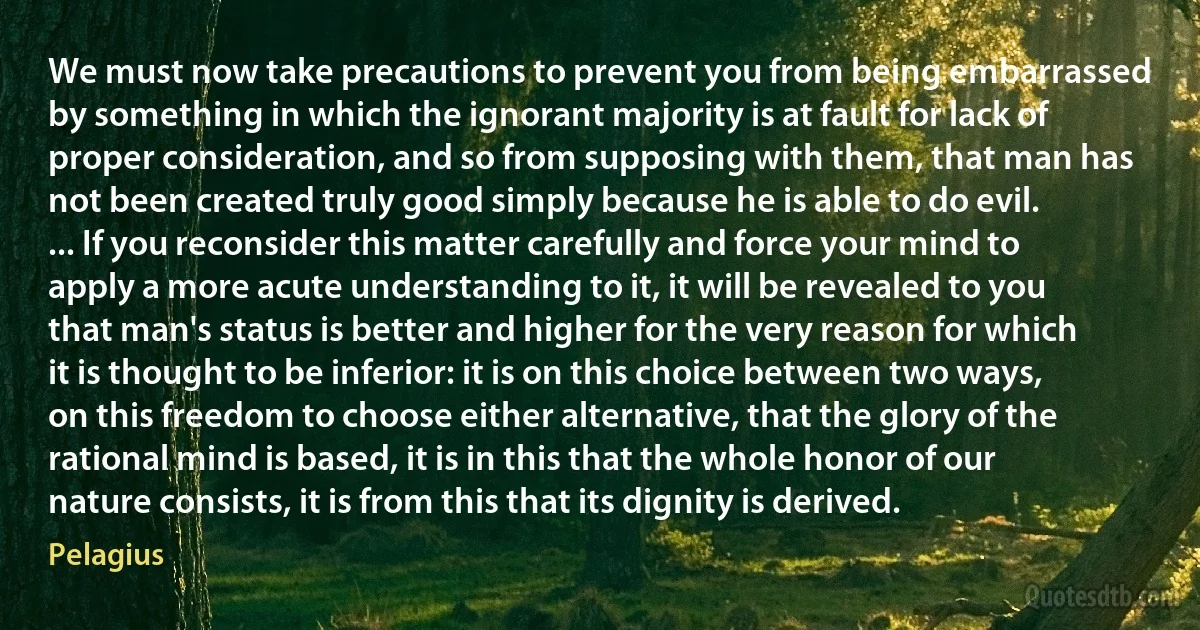Supposing Quotes - page 2
Freemasonry... has no pretension to assume a place among the religions of the world as a sectarian "system of faith and worship," in the sense in which we distinguish Christianity from Judaism, or Judaism from Mohammedanism. In this meaning of the word we do not and can not speak of the Masonic religion, nor say of a man that he is not a Christian, but a Freemason. Here it is that the opponents of Freemasonry have assumed mistaken ground in confounding the idea of a religious Institution with that of the Christian religion as a peculiar form of worship, and in supposing, because Freemasonry teaches religious truth, that it is offered as a substitute for Christian truth and Christian obligation.

Albert Mackey
The goodness and greatness of a man do not justify us in accepting a belief upon the warrant of his authority, unless there are reasonable grounds for supposing that he knew the truth of what he was saying. And there can be no grounds for supposing that a man knows that which we, without ceasing to be men, could not be supposed to verify.

William Kingdon Clifford
If the material world rests upon a similar ideal world, this ideal world must rest upon some other; and so on, without end. It were better, therefore, never to look beyond the present material world. By supposing it to contain the principle of its order within itself, we really assert it to be God; and the sooner we arrive at that Divine Being, so much the better. When you go one step beyond the mundane system, you only excite an inquisitive humour which it is impossible ever to satisfy.

David Hume
I wish to propose a doctrine which may, I fear, appear wildly paradoxical and subversive. The doctrine in question is this: that it is undesirable to believe a proposition when there is no ground whatever for supposing it true. I must, of course, admit that if such an opinion became common it would completely transform our social life and our political system; since both are at present faultless, this must weigh against it.

Carl Sagan
Philosophers are generally persuaded, that the sensations of heat and cold are occasioned by the presence or absence, in degree, of certain principle or quality denominated fire or heat... It is most probable, that all substances whatever contain more or less of this principle. Respecting the nature of the principle, however, there is a diversity of sentiment : some supposing it a substance, others a quality, or property of substance. Boerhaave, followed by most of the moderns, is of the former opinion; Newton, with some others, are of the latter; these conceive heat to consist in an internal vibratory motion of the particles of bodies.

John Dalton
Naturally man tended to lose his sense of scale and relation. A straight line, or a combination of straight lines, may have still a sort of artistic unity, but what can be done in art with a series of negative symbols? Even if the negative were continuous, the artist might express at least a negation; but supposing that Omar's kinetic analogy of the ball and the players turned out to be a scientific formula! supposing that the highest scientific authority, in order to obtain any unity at all, had to resort to the middle-ages for an imaginary demon to sort his atoms! how could art deal with such problems, and what wonder that art lost unity with philosophy and science! Art had to be confused in order to express confusion; but perhaps it was truest, so.

Henry Adams
Nearly everyone who is unemployed votes "Democrat." Nearly every immigrant, at least in the first generation, votes "Democrat." Nearly every non-white American votes "Democrat." The GOP know that so intellectually and financially bankrupt an administration should never have been re-elected - indeed, given the scale of electoral fraud practiced by the "Democrats," he may not actually have been re-elected (always supposing that he had the constitutional right to hold the office of president in the first place).

Christopher Monckton
There is room in the world, no doubt, and even in old countries, for a great increase of population, supposing the arts of life to go on improving, and capital to increase. But even if innocuous, I confess I see very little reason for desiring it. The density of population necessary to enable mankind to obtain, in the greatest degree, all the advantages both of co-operation and of social intercourse, has, in all the most populous countries, been attained. If the earth must lose that great portion of its pleasantness which it owes to things that the unlimited increase of wealth and population would extirpate from it, for the mere purpose of enabling it to support a larger but not a better or a happier population, I sincerely hope, for the sake of posterity, that they will be content to be stationary, long before necessity compels them to it..

John Stuart Mill
[The Analytical Engine] might act upon other things besides number, were objects found whose mutual fundamental relations could be expressed by those of the abstract science of operations, and which should be also susceptible of adaptations to the action of the operating notation and mechanism of the engine...Supposing, for instance, that the fundamental relations of pitched sounds in the science of harmony and of musical composition were susceptible of such expression and adaptations, the engine might compose elaborate and scientific pieces of music of any degree of complexity or extent.

Ada Lovelace
You are also mistaken in supposing that I have an anti-German obsession. British policy for four hundred years has been to oppose the strongest power in Europe by weaving together a combination of other countries strong enough to face the bully. Sometimes it is Spain, sometimes the French monarchy, sometimes the French Empire, sometimes Germany. I have no doubt who it is now...It is thus through the centuries we have kept our liberties and maintained our life and power.

Winston Churchill
Moreover, it must be confessed that perception and that which depends upon it are inexplicable on mechanical grounds, that is to say, by means of figures and motions. And supposing there were a machine, so constructed as to think, feel, and have perception, it might be conceived as increased in size, while keeping the same proportions, so that one might go into it as into a mill. That being so, we should, on examining its interior, find only parts which work one upon another, and never anything by which to explain a perception. Thus it is in a simple substance, and not in a compound or in a machine, that perception must be sought for.

Gottfried Leibniz
And so, supposing that light impinging on a refracting or reflecting ethereal superficies puts it into a vibrating motion, that physical superficies being by the perpetual applause of rays always kept in a vibrating motion, and the ether therein continually expanded and compressed by turns, if a ray of light impinge on it when it is much compressed, I suppose it is then too dense and stiff to let the ray through, and so reflects it; but the rays that impinge on it at other times, when it is either expanded by the interval between two vibrations or not too much compressed and condensed, go through and are refracted.

Isaac Newton
It has been the persuasion of an immense majority of human beings in all ages and nations that we continue to live after death,-that apparent termination of all the functions of sensitive and intellectual existence. Nor has mankind been contented with supposing that species of existence which some philosophers have asserted; namely, the resolution of the component parts of the mechanism of a living being into its elements, and the impossibility of the minutest particle of these sustaining the smallest diminution. They have clung to the idea that sensibility and thought, which they have distinguished from the objects of it, under the several names of spirit and matter, is, in its own nature, less susceptible of division and decay, and that, when the body is resolved into its elements, the principle which animated it will remain perpetual and unchanged.

Percy Bysshe Shelley
In the "static" universe expansion is impossible, the "empty" universe does expand. Therefore we may be tempted to consider the empty universe as the most likely approximation; and we can proceed to compute the radius of curvature of the universe, supposing it to be of the empty type, from the observed rate of expansion.

Willem de Sitter
The Sanscrit language, whatever be its antiquity, is of a wonderful structure; more perfect than the Greek, more copious than the Latin, and more exquisitely refined than either, yet bearing to both of them a stronger affinity, both in the roots of verbs and the forms of grammar, than could possibly have been produced by accident; so strong indeed, that no philologer could examine them all three, without believing them to have sprung from some common source, which, perhaps, no longer exists; there is a similar reason, though not quite so forcible, for supposing that both the Gothic and the Celtic, though blended with a very different idiom, had the same origin with the Sanscrit; and the old Persian might be added to the same family.

William Jones
The domination inherent in the slave-owning system is not repressed, as with the bourgeois, but is conscious, and the illusion consists, not in supposing that no domination exists, but that society is in fact really determined solely by the will of the master, and does not in turn determine his will.

Christopher Caudwell



